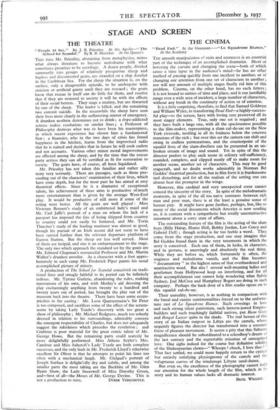STAGE AND SCREEN
THE THEATRE
" People At Sea." By j. B. Priestley. At the Apollo—" The School for Scandal." By R. B. Sheridan. At the Queen's
Tins time Mr. Priestley, abstaining from metaphysics, mixes what always threatens to become melodrama with what sometimes promises to be sociology. A dozen people, divided summarily into groups of relatively prosperous sheep and hapless and discontented goats, are stranded on a ship derelict in the Caribbean Sea. For the sheep the situation is, on the surface, only a disagreeable episode, to be undergone with stoicism or artificial gaiety until they are rescued ; the goats know that rescue in itself can do little for them, and resolve that if they are restored to society it will be with the effects of their social betters. They stage a mutiny, but are thwarted by one of the sheep. The leader is killed, and the remaining two commit suicide. In the meanwhile the sheep have seen their lives more clearly in the unflattering mirror of emergency. A drunken aesthete determines not to drink; a dope-addicted actress makes resolutions on similar lines ; a Professor of Philosophy destroys what was to have been his masterpiece, in which recent experience has shown him a fundamental flaw ; a financier, who in the two days of crisis has found happiness in the kitchen, learns from the improvised radio that he is ruined and decides that in future he will cook cutlets and not accounts. Various other minor moral improvements are effected among the sheep, and by the time that the rescue party arrives they can all be certified as fit for restoration to society. The goats have, of course, all been liquidated.
Mr. Priestley has not taken this familiar and rather silly story very seriously. There are passages, such as those pro- ceeding out of the characters' examination of their lives, which have some depth, but for the most part he has aimed at easy theatrical effects. Since he is a dramatist of exceptional talent, his achievement of these aims is productive of much more entertainment than is given by the average West-End play. It would be productive of still more if some of the acting were better. All the goats are well played : Miss Vivienne Bennett's study of an embittered lady's maid and Mr. Carl Jaffe's portrait of a man on whom the lack of a passport has imposed the fate of being shipped from country to country could not easily be bettered, and Mr. Torin Thatcher's study of the leading mutineer was almost as good, though his pursuit of an Irish accent did not seem to have been carried further than the relevant departure platform of Euston Station. But the sheep are less well served. Most of them are insipid, and one is an embarrassment to the stage. The only two which approach the standard set by the goats are Mr. Edward Chapman's resourceful Professor and Mr. Martin Walker's drunken novelist. As a character with a foot appre- hensively in each camp Mr. Frederick Piper paints his usual accomplished picture of misery.
A production of The School for Scandal conceived on tradi- tional lines and smugly faithful to its period can be infinitely tedious. Mr. Tyrone Guthrie, abandoning the rules, making innovations of his own, and with Motley's aid dressing the play enchantingly anything from twenty to a hundred and twenty years out of period, has brought the play out of the museum back into the theatre. There have been some eccen- tricities in the casting : Mr. Leon Quartermaine's Sir Peter is too composed, and sacrifices some of the effect of the screen- scene by taking Lady Teazle's discovery with too great a show of philosophy ; Mr. Michael Redgrave, much too soberly dressed in relation to his surroundings, admirably conveys the emergent respectability of Charles, but does not adequately suggest the rakishness which precedes the revelation ; and Crabtree is poor material for the great comic talent of Mr. George Howe. But the remaining parts could scarcely be more delightfully performed. Miss Athene Seyler's Mrs. Candour and Miss Ashcroft's Lady Teazle are both complete successes, and the only fault in Mr. Frederick Lloyd's otherwise excellent Sir Oliver is that he attempts to point his lines too often with a mechanical laugh. Mr. Gielgud's portrait of Joseph Surface is delightnilly dry and iubde, and among the smaller parts the most taking are the Backbite of Mr. Glen Byam Shaw, the Lady Sneerwell of Miss Dorothy Green, and—best of all—the Moses of Mr. George Devine. This is


























































 Previous page
Previous page